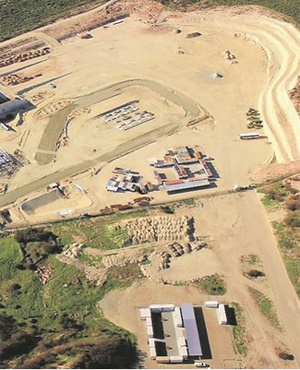“When things are broken, I want to fix them,” Sonn said in an interview at Steinhoff’s headquarters in Stellenbosch, South Africa. “It was clear it was going to take a heck of a lot of time and I would have to step out of other formal roles as this was going to be an immersion.”
Six months on, Sonn, who has likened the embattled retailer to a burning building, is still in firefighter mode.
The owner of Conforama in France, Britain’s Poundland and Mattress Firm in the US arranged new credit lines for units in those countries in January and has raised some $2bn selling assets to stay afloat. The next big test for Sonn and her newly established board comes on Friday: a meeting with lenders to start working toward a restructuring of more than €10.4bn ($12.3bn) of debt.
Nor is there an end in sight. An audit of Steinhoff’s books by accountants at PwC may drag on until the end of the year. Investigations are under way across several countries. And billion-dollar legal claims are arriving, including shareholder class-action cases in Germany and the Netherlands.
Even Sonn’s predecessor as chairperson, billionaire Christo Wiese, is suing, for about $4.8bn.
Sonn isn’t a newcomer to Steinhoff’s supervisory board. She joined in December 2013, four years before the crisis erupted. Her name was put forward by her father, Franklin Sonn, an anti-apartheid activist and former ambassador to the US who served as a non-executive director at the company for more than a decade.
Heather had done her undergraduate studies at Smith College and earned a graduate degree in international business from Georgetown. Her experience included stints at Merrill Lynch & Co, Sanlam Investment Management and Barclays Plc. In joining Steinhoff’s board, she says she was keen to understand how South African companies with large, global businesses worked. Now she’s getting a crash course.
“This is the best experience I could ever gain from work, but I just hope I never have to apply it all again,” said Sonn.
Seated in a wood-paneled board room with a painting of a derelict building almost covering one wall, she was personable and focused. She said she’s not the only one who’s working hard, and praised the efforts of the revamped board and management team.
Her most frightening moment occurred just before the crisis began, when Chief Executive Officer Markus Jooste failed to turn up for a key meeting with directors in early December.
“We were aware that Deloitte had raised questions, but they were being dealt with,” Sonn said. “When I arrived I could see from the mood that it was serious, but I was still expecting Jooste to show up. Hearing that he wouldn’t was terrifying as I then knew something was seriously wrong.”
Jooste, who’d led Steinhoff on a decades-long acquisition spree that turned it into one of South Africa’s biggest companies, quit on December 5. Less than two weeks later, Wiese had also stepped down.
Since taking over as chairperson, Sonn has been spending up to 14-hour days wading through the consequences. Her fluency in Afrikaans, the primary language used in the Stellenbosch area, has undoubtedly helped. Even so, compared to the previous, largely homogeneous board, she stands out.
Some stakeholders would prefer a chairperson with deep experience managing large, global corporations. For them, it’s impossible to compare a relative unknown like Sonn to Wiese, who’s spent five decades building and running companies. For others, such as The Public Investment Corporation, Steinhoff’s largest investor, mixing up South African boards is exactly what’s needed.
Steve Booysen, who’s been a Steinhoff director since 2009 and heads the audit and risk committee, describes Sonn’s style as consultative, calm and “firm at the right time”.
“You can have all the qualifications, with 20 years accounting experience, and nothing can prepare you for this,” said Graeme Korner, a fund manager at Johannesburg-based Korner Perspective. “The best credentials you can possibly have are a mindset of saying let me try to make the best of this lousy situation, be as honest and open as possible and try and limit the fallout.”
Still, investors who’ve had their trust in the company shattered are asking why no one on the board, Sonn included, spotted the problem much earlier.
“There must have been a lot of smoke,” said Mark Hodgson, a Cape Town-based analyst at Avior Capital Markets. “What key actions had the board taken to convince themselves that all was okay?”
Wiese, 76, told South African lawmakers in January that news of the irregularities came as a “bolt from the blue,” and that detecting fraud is very difficult for board members, especially if the CEO is involved, as has been alleged in the case of Steinhoff.
Sonn said that great efforts had been made to keep things hidden, describing the scandal as “the worst thing that could have happened on our watch”.
Now, in trying to set things right, she has to decide how to define success, no simple task in a situation that’s unlikely to have a happy ending for anyone involved - not investors, creditors or employees.
“For me, what that looks like is all stakeholders are dealt a fair outcome,” she said.
“We have to uncover all wrongdoing and pursue the guilty. And then at the same time, so far as possible, try and prevent job losses, make good on our commitments with regards to lenders and, as far as we possibly can, protect or recover some value for shareholders.”


